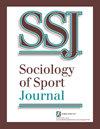Overcoming Gender Barriers in Sports—An Opportunity of Adventure/High Risk Sports?
IF 2.2
3区 教育学
Q2 HOSPITALITY, LEISURE, SPORT & TOURISM
引用次数: 1
Abstract
Adventure/high risk sports (AHRS) were developed in a different social context and are usually not separated by sex which might lead to differences in gender-related experiences. This study qualitatively compared 10 female traditional sport participants (soccer players) with 10 female AHRS participants (trad climbers [TC]) regarding their experience of possible gender-related advantages and disadvantages in their sports. The TC climbed with more male partners. The TC reported to not consider gender as a determining factor in the choice of climbing partner or their trad climbing experience. The TC mentioned more female advantages in their sport participation and reported fewer gender-related barriers than soccer players. Differences might be explained through mixed gender sports participation and the differing demands in TC. Unlike traditional sports, AHRS does not imply defeating an opponent. The challenge in AHRS is set by the participant and the environmental conditions, which seem to be less related to sex and gender.克服运动中的性别障碍——冒险/高风险运动的机遇?
冒险/高风险运动(AHRS)是在不同的社会背景下发展起来的,通常不以性别区分,这可能导致性别相关体验的差异。本研究定性比较了10名女性传统运动参与者(足球运动员)和10名女性AHRS参与者(攀岩运动员[TC])在运动中可能存在的与性别相关的优势和劣势。TC与更多的男性伙伴一起爬升。TC报告说,在选择攀岩伙伴或他们的攀岩经验时,性别不是一个决定因素。与足球运动员相比,女性在参与体育运动方面有更多的优势,并报告了更少的性别障碍。这一差异可以通过男女混合体育参与和不同的技术要求来解释。与传统体育不同,AHRS并不意味着要打败对手。AHRS中的挑战是由参与者和环境条件决定的,这似乎与性别和性别的关系不大。
本文章由计算机程序翻译,如有差异,请以英文原文为准。
求助全文
约1分钟内获得全文
求助全文
来源期刊

Sociology of Sport Journal
社会科学-运动科学
CiteScore
3.00
自引率
29.40%
发文量
51
审稿时长
>12 weeks
期刊介绍:
Published four times a year (March, June, September, December), the Sociology of Sport Journal (SSJ) publishes original research, framed by social theory, on exercise, sport, physical culture, and the (physically active) body. Analyses from diverse theoretical and methodological perspectives are encouraged to stimulate further research, critical thought, and theory development on topics ranging in broad scope from global professional sport, coaching, commercial exercise/fitness, and recreational physical activity. The journal publishes an array of peer-reviewed research articles, research notes, and book reviews. Members of the North American Society for the Sociology of Sport (NASSS) receive SSJ as part of their membership.
 求助内容:
求助内容: 应助结果提醒方式:
应助结果提醒方式:


